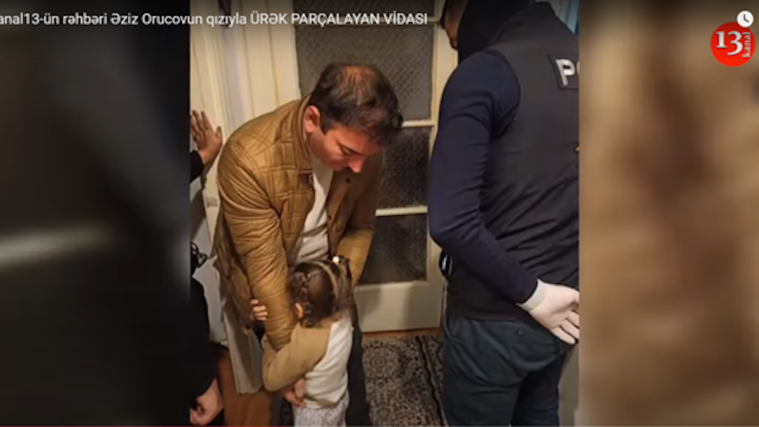Stockholm, November 29, 2023—Azerbaijani authorities should release Aziz Orujov, director of the popular television channel Kanal 13, from detention on charges of illegal construction, and cease their legal harassment of independent media, the Committee to Protect Journalists said Wednesday.
The Sabail District Court in Azerbaijan’s capital, Baku, on Tuesday ordered that Orujov be held in pre-trial detention for three months after police arrested the journalist on Monday and searched his home, office, and vehicle, according to news reports and Orujov’s lawyer, Bahruz Bayramov, who spoke to CPJ.
If found guilty, he faces up to three years in prison under Article 188.2 of Azerbaijan’s criminal code.
Bayramov told CPJ that Orujov had been building a home for himself on a plot of land that he had purchased. While the land was not officially registered to Orujov, Bayramov said that this was also the case for thousands of other homes in Baku, and that he was not aware of anyone else being arrested for the offense. Instead, the charges were in retaliation for Orujov’s journalism, according to the lawyer.
The independent online broadcaster Kanal 13, which has more than 2 million subscribers on its YouTube channels, regularly covers sensitive topics such as demonstrations and human rights violations and gives space to opposition views, Alasgar Mammadli, founder of Media Rights Group, which advocates for press freedom in Azerbaijan, told CPJ.
“Hot on the heels of last week’s arrest of three journalists and media workers at the anti-corruption outlet Abzas Media, Azerbaijani authorities appear to be targeting yet another critical online news platform with the arrest of Aziz Orujov,” said Gulnoza Said, CPJ’s Europe and Central Asia program coordinator, in New York. “Azerbaijani authorities should release Orujov, drop the charges against him, and end their crackdown on the independent press.”
Orujov’s wife, Lamiya Orujova, told CPJ that her husband was arrested “like a terrorist,” by eight police officers, seven of whom were wearing masks. Police confiscated documents and USB sticks from Kanal 13’s office, and also took two laptops, a cell phone, documents, and bank cards from their home, she said.
Bayramov told CPJ that there was no legal basis under the illegal construction charges for conducting the searches and ordering Orujov’s pretrial detention.
Mammadli told regional outlet Caucasian Knot that there were around 500,000 illegally built homes in and around Baku, and that authorities’ decision to target the head of a popular and critical media platform on these grounds heralded “a new wave in the witch hunt against journalists” in Azerbaijan.
On November 21, a court detained Abzas Media’s director Ulvi Hasanli and chief editor Sevinj Vagifgizi for four months on charges of conspiring to bring money into the country unlawfully. Mahammad Kekalov, an assistant to Hasanli, was later ordered detained for the same period. On Tuesday, Azerbaijani authorities summoned the U.S., German, and French envoys and accused their embassies and organizations registered in those countries of unlawfully funding Abzas Media.
It is not the first time that Orujov has been jailed. In 2017, authorities sentenced him to six years in prison on charges of illegal entrepreneurship and abuse of power, which was widely viewed as retaliation for his journalism, and later released him on probation in 2018.
On December 8, Azerbaijan’s Deputy Minister of Internal Affairs, Fazil Guliyev, told CPJ by email that Orujov was summoned by police on November 27, and that information that he was arrested by eight police officers, most of them masked, “does not reflect the truth.”
Guliyev said Azerbaijani legislation allows a court to order up to three months’ pretrial detention for illegal construction offenses, and that this year to date 34 individuals besides Orujov have been criminally prosecuted on the same charges. “The media in our country is free, and no one, including journalists … can be prosecuted for exercising their freedom of expression and opinion,” the deputy minister added.
Editor’s note: This text has been updated in the final two paragraphs with comment from the deputy minister of internal affairs and in the third paragraph to correct the number of the Article cited.
